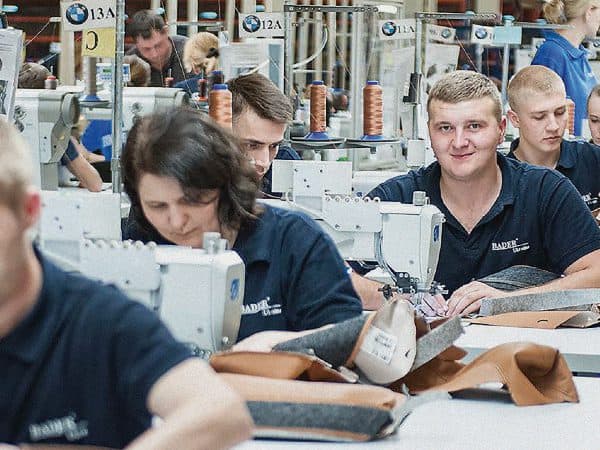
Bader
a global lean leather manufacture
With 148 years of company history, the Göppingen-based automotive supplier Bader is only several years older than the auomobile itself.
It was not until the early 1980s that the family business and the automotive industry came together. Without exaggerating , the decision can be described as the second company founding by the leather specialist. The number of employees increased from 150 to more than 12,000 with eleven locations on five continents. The family business is currently managed in the 4th generation by Thomas Bader, but the 5th generation is already actively involved in all business areas. A new global production system should put the current growth path on a secure footing as well as in the future.
Anyone who enters the foyer of the traditional Göppingen-based company Bader will quickly recognize the company’s strong focus on something that even nearly 130 years after the invention of the automobile, still delights all automotive lovers, especially when it comes to car features, namely leather. Seat covers, armrests, steering wheels, door trims, instrument panels, gear knobs or gear shift boots – the Rosslederfabrik Otto Bader (today Bader GmbH & Co. KG), founded in 1872 as a tannery for shoe leather, is one of the leading leather manufacturers for the global automotive market.

“Leather has many unique qualities that hardly any other material can achieve,” Authorized Representative at Bader Florian Oeser says as we walk past many leather seats in the entrance hall, including exhibits that reflect the company’s origins. Oeser, who as Head of Sewing Business is responsible for all Bader sewing departments around the world, also emphasizes the sustainability of leather: “Always bearing in mind the important discussion regarding meat consumption, our raw material is a by-product of the food industry, which we treat with a high degree of responsibly at all stages of leather production.
In order to guarantee that leather is carefully handled, Bader relies on a high level of vertical integration, which Oeser pridefully describes as the “company’s formula for success.” Stephan Panian, Partner and Automotive Expert at Staufen AG, underlines the differences to other automotive suppliers: “For a windscreen wiper motor, for example, only the design and assembly are in the same hand, whereas all motor parts are supplied by Tier 2 or Tier 3 companies. This is completely different when processing leather at Bader – from the raw hide to the finished leather seat cover.”
“Perfect partner with a global footprint”
In order to shape this high level of vertical integration and the enormous growth over the past few years so that the position achieved on the world market can be sustained or even expanded, Bader has developed the “Bader Operating System” (BOS) together with Staufen AG. Thomas Edelmann’s task is now to further develop this system and roll it out at all Bader locations. “Particularly in the development and roll-out phase, we needed a partner with a global footprint,” says the Head of Global Lean Management. “The fact that Staufen AG has its own offices with local consultants in Central and Eastern Europe as well as in Mexico was perfect for us.”
According to Staufen project manager Stephan Panian, the aim was to make the production system as tangible as possible right from the beginning, i.e. not only create a common understanding of quality, customer proximity and flexibility, but also provide all employees and executives with a “toolbox.” “By standardizing approaches and establishing clear principles, the BOS offers an enormous amount of stability and thus also security to our processes,” says lean expert Edelmann. “The basis for this is the new workshop concept, i.e. the in-depth analysis of a specific problem by a small, interdisciplinary and powerful team, followed by the uniform application of the solution throughout the entire organization.”
Ukraine: From 40 to 4,000 employees in 10 years
In order to ensure the success of such changes in an international company whose plants operate largely independently and were and still are characterized by different management cultures, all locations had to be closely involved from the very beginning. For this reason, representatives from all of the plants involved were part of the so-called “core team,” which essentially formed workshop number 1 in the cascade of BOS workshops initiated in 2018.
Rudolf Bobrov has been a member of this team from the very beginning. The COO of Bader plants in Ukraine was faced with very special challenges. “When I came to Horodok in 2009, there were 40 employees, now there are 4,000. Although we have always succeeded in meeting the quality requirements of our customers despite immense growth, there was too little time to identify additional potential for improvement in the processes. Lean and BOS now provide us with the right tools for this.” Supported by Staufen consultants from the Polish branch, several lighthouse projects were launched in Ukraine just in the first year. And with success: Productivity has noticeably improved in the sewing shop. And improvements were also quickly achieved in leather cutting and logistics.
Whereas this success perhaps remained a purely Ukrainian matter in the past, the solutions developed in Horodok are now also available to the other locations.
“We now have standardized processes and documentation that make it much easier for us to exchange information,” says Plant Manager Bobrov.
His Mexican colleague CEO Jorge Veloz and his local BOS manager think the same. According to Veloz, the involvement of top management from the very beginning was a key factor in the success of the lighthouse project in Mexico. The fact that the employees already had basic knowledge of lean philosophy was another advantage. For the future, Veloz hopes that a noticeable improvement in key financial figures and a change in mentality at all levels of the organization will turn the “workshops” into a daily routine rather than just being used sporadically as in the past.
Working with local Staufen consultants was also very helpful during the roll-out in Mexico. “Especially when it comes to cultural topics, the benefit of having native speakers is enormous,” says Bader Manager Oeser. “In addition, the locations are to learn from each other, but nobody has anything imposed on them. Workshops are also held at all locations in order to acquire and internalize knowledge that is fundamental to the success of the BOS. Lean expert Edelmann adds, “knowledge from all hierarchical levels at each location contributes to our success. The knowledge must therefore be united in order to be implemented quickly.”
And what do customers say about the new Bader Operating System? The new production system has been very well received during industry visits and audits. More and more OEMs are now even making certain standards in production and also in logistics a prerequisite for cooperation.
Please feel free to contact me if you want to get any further information
STEPHAN PANIAN, Partner, STAUFEN.AG
Leadership of projects for implementation and transformation of production systems, Shop Floor Management, Toyota Kata and global Lean training programs
Lean Trainer and Management Coach
phone: +49 7024 8056 0, e-mail: contact@staufen.ag

